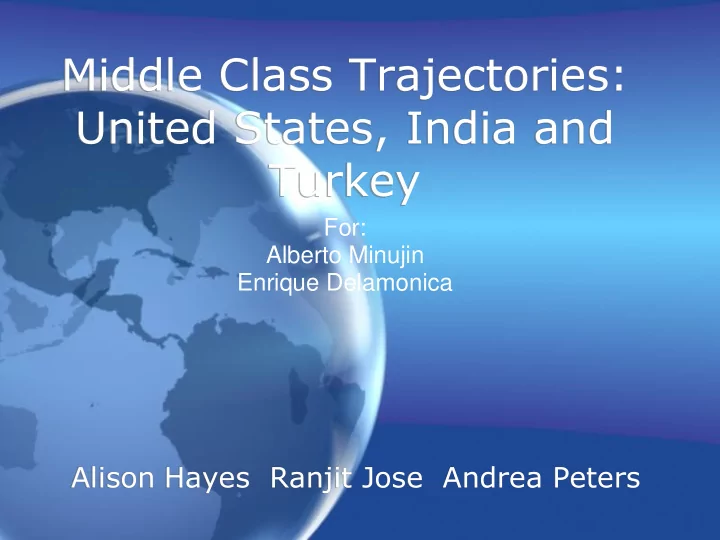

Middle Class Trajectories: United States, India and Turkey For: Alberto Minujin Enrique Delamonica Alison Hayes Ranjit Jose Andrea Peters
Why Study the Middle Class? • The importance of the middle class in terms of stability and peace • The alternative leads to gross inequalities, revolution or oppression Why Study America, India and Turkey? • Profound changes occurring within the middle classes of India and America, potentially related to each other • Turkey, client driven Initial research project with intention for extended future research and publication
Max Weber • A large middle is a beneficial, stabilizing influence on society, because it has neither the possibly explosive revolutionary tendencies of the lower class, nor the absolutist tendencies of the upper class. • Middle class composed of a quasi-elite (professionals and managers) largely immune to economic downturns and trends such as outsourcing which affect the statistical middle class.
Aristotle • The middle class has political prowess and legal democratic values. • Acts as a mediating class between the rich and poor.
Methodology • Thesis • Researched published sources • Interviews with: Academics Experts Individuals familiar with current trends • Grant Writing/Budget Proposal Workshop
Deliverables • Research Paper Identifying basic definitions of the middle class Examining the historical framework in the development of the middle class in three countries Economic data • Grant Proposal
Definitions Social • College Education • Full time, stable employment • Home ownership • Automobile ownership • Knowledge of English (India/Turkey)
Population 301,139,947 1,129,866,154 71,158,647 % Middle Class 64% 25% 22% Middle Class $25,000 - $4380 - $300 - $6,000 by $100,000 $21,890 Income Human 8 126 92 Development Index
American Middle Class • 1950’s • Policies after Second World War • Conception of American Dream • Company Job • Home • Car
• Shape of income distribution is changing • Increasingly difficult to afford housing and • Necessities (food, clothing, transportation, healthcare)
• No margin for error • No room in budget to care for sick family members • The modern American family is walking a high wire without a net. Harvard Magazine February 2006
Professor Jacob Hacker, Professor, Political Science Yale University • Serious and unstable •“The Great Risk Shift” • Massive transfer of economic risk • Reshaped Americans’ relationships to their government, employers and to themselves
Indian Middle Class • Middle Class did not emerge but was established by way of the caste system. • Colonial rule spread English language among the upper castes. • Major employer was the civil service.
Madras High Tech Center 1990s • Neo-liberal economic reforms • Multi-national companies competing with Indian firms • Increasing employment opportunities • Greater ability to save and invest • Emergence of an “Indian Dream”
Turkish Middle Class • Turkish middle class slowly emerged in early 1900’s as Ottoman empire weakened. • Modern Turkey formed in 1923, middle class mostly tied to government (military, bureaucrats) • Alternating periods of rapid growth and deflation • Economic reforms such as privatization begin in 1980’s • Economic crisis of 1990’s, middle class loses savings, inflation at 125%
Unable to Gain a Foothold • Military Coups (1960, 1971, 1980) and 1997 military intervention • Economic Instability and Failed Reforms (IMF 1980’s) • Earthquakes (1939, 1944, 1957, 1967, 1999)
Distribution of annual total household income: income shares of quintiles and Gini-Coefficients Quintiles 1963 1968 1973 1986 1987 1994 2002 2003 Lowest 4.5 3 3.5 3.9 5.24 4.86 5.3 6 20% Next 20% 8.5 7 8 8.4 9.61 8.63 9.8 10.3 Next 20% 11.5 10 12.5 12.6 14.08 12.91 14 14.5 Next 20% 18.5 20 19.5 19.2 21.15 19.03 20.8 20.9 Highest 57 60 56.5 55.9 49.94 54.88 50.1 48.3 20% Gini- n/a .56 .51 n/a .44 .49 .44 .42 Coefficient Source: 1963-1987 Kasnakoglu, All others from Turkish State Statistical Institute
Comparative Gini-coefficient data United States, India, Turkey 60 50 40 India 30 Turkey United States 20 10 0 1965 1975 1985 1995 2000 2005
Turkey Today QuickTime™ and a Secularists Take To Turkey's TIFF (Uncompressed) decompressor are needed to see this picture. Streets Monday, Apr. 30, 2007 Time.com By PELIN TURGUT Turkish secularists protest against the Development Party's (AKP) presidential candidate, Abdullah Gul, during a rally in Istanbul, Turkey April 29, 2007. Parking space, not politics, is what usually gets my thoroughly decent, middle-class Istanbul neighborhood in a twist. But Sunday morning, the Burberry set trendy teenagers in Ray-ban Aviators, pensioners in sun hats, young professionals and entire families turned revolutionary. Waving red and white Turkish flags and chanting "Turkey will not become Iran," they streamed up the road by the hundreds to join the city's biggest secularist rally in recent memory.
The Future of the Middle Class in Turkey? • Unpredictable nature of Turkish economy • Disagreement among leading economists • Political Instability • Continued conflicts between secularist and Islamic held political positions • European Union • Global volatility
What next, U.S.A.? • Globalization has led to job volatility • Increased inequality • Decreased social mobility • Diminished American Dream?
Expectations for India • Middle Class projected to reach 583 million by 2025. • At current growth rate, incomes are set to triple over next two decades. • Might become 5 th largest consumer market (surpassing Germany).
Challenges • Availability of Economic Data (India, Turkey) • Expert List (India, Turkey) • Limited Studies on Middle Class (Turkey) • Research needed narrowing
Recommend
More recommend